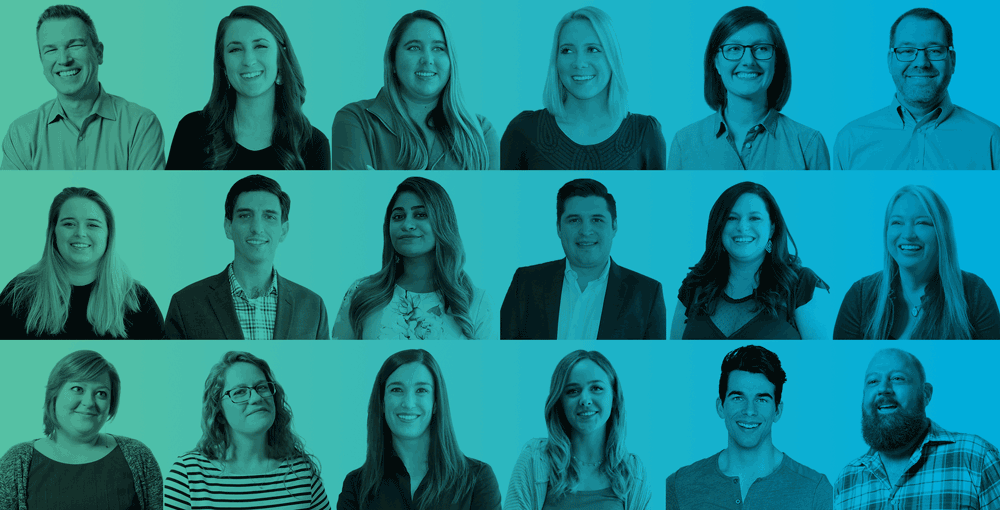I’m a big fan of NeimanLab, which explores the evolving news landscape and changing face of journalism. After reading Laura Hazard Owen’s summary of some new research from Reuters, I shared the findings with our team to discuss the potential impact on B2B tech companies.
Here’s what unfolded in our Slack chat:
--------------------------------------------------------------------------------
Liz (Liz Cies, vice president): Alrighty everyone.... who's ready to discuss digital news consumption? So let's discuss this summary of Reuters Institute’s Digital News Report for 2018.
Liz: "The use of social media (read: Facebook) for news is declining." Have you found that to be the case in your personal news consumption?
Katie (Katie Long, vice president): Absolutely. I've drastically reduced how often I even visit Facebook.
Brittany (Brittany McLaughlin, account manager): My use of Facebook has been declining in general, but it's definitely not a source I trust for news.
Donna (Donna Brannin, account executive): I'm even considering getting rid of my Facebook.
Brittany: I think it's interesting that they didn't include YouTube on the list of social media sites, since I actually think there is an opportunity there for new consumption.
Jacqueline (Jacqueline Wasem, account manager): I still use FB a ton for news - but over the last year - I've become way more selective about what news orgs I want in my feed... high bar for outlets like Axios, Buzzfeed, and the NY Times.
Lauren (Lauren Redman, account coordinator): For sure! Me too, Donna. The only thing holding me back is family.
Katie: Facebook used to be a way to connect with friends, and now it seems like it is trying to be all things for all people. It's a little overwhelming if you don't have a lot of time on your hands. There's also a lot of useless noise, often caused by the most opinionated people.
Farha (Farha Syed, account executive): I definitely do not use Snapchat at all now. Ever since I switched to Instagram stories, I just don't even touch Snapchat.
Les (Les Worley, sr. content manager): I wonder if our use of Facebook for news may skew high compared to consumers, just based on what we do (marketing).
Liz: That's true, Les. I definitely approach it through the eyes of a marketer.
Farha: It's nice to have everything consolidated into one social platform. But I feel like a lot of features are overdone like the ability to put up stories or have live videos.
Alexis (Alexis Natale, account coordinator): I'm on Facebook frequently because of my foster puppies, lol. However, as far as news goes - whenever I see someone share an article I always look at the source. I view Facebook news sharing as extremely bias and unreliable, I've even accidentally shared "fake news" a time or two when I have not taken the time to do my research.
Colton (Colton Hightower, account coordinator): I feel as if my use of Facebook has drastically changed as well. I did enjoy hearing that Facebook was changing the algorithm a few months back to feature content that was more likely to have engagement. However, I do not feel as if I have been able to see a significant change in the content I see regularly.
Farha: I think people are still using social media to find news articles, but are not posting their opinions as much. At least that's how I use Facebook. I still consume news from Facebook, but I usually just send articles using another channel.
Les: And, to me (and this may be generational, what can i say?) but I would NEVER look to Facebook for news of any kind. I never did. I’d perhaps look to LinkedIn, but never Facebook, even before the fake news and other scandals.
Liz: Knowing that consumers are using social media less for news consumption, how do you see this impacting digital strategies for B2B tech companies?
Jacqueline: I always saw the rise of social media news consumption driving a greater emphasis on visual content - I wonder what this trend will do to that media form.
Brittany: Again, I point to YouTube. I think there might be an opportunity there where people are using that platform for news consumption. There are several channels based on type of news: https://www.youtube.com/channel/UCYfdidRxbB8Qhf0Nx7ioOYw/channels
Brittany: People like Philip DeFranco are increasing in popularity.
Lauren: Brittany, I have watched news on YouTube for years, you have to be careful about the channels you chose to watch, but it's still a good alternative for cord cutters.
Donna: Brittany, I haven't tried using YouTube as a news source but I want to give it a try!
Brittany: And he's funded through supporters on Patreon, so that aligns with what the article says about people paying for news sources.
Les: I still tend to think of YouTube as entertainment, though of course it isn’t all that way. For example, I look to it for educational matters (how to fix my refrigerator), but I can’t say I think of it as news.
Katie: What I'm wondering is if this will change incentives or pressure on our media contacts who share their articles through Facebook. Are they noticing a drop in shares, likes, etc.?
Jacqueline: Exactly. How will this affect publishers - will they chase younger audiences across various apps? How do we help our clients respond to that?
Liz: That's a great question, Katie. I'm curious how media companies are changing how they evaluate success after relying on social-driven traffic for so long.
Brittany: Well, in general the role of the reporter is changing and has been for a while. They're no longer just responsible for reporting the news, but for driving traffic to their content.
Liz: "The researchers suggest that people feel more comfortable moving their discussions to closed messaging apps like WhatsApp." Have y'all seen any publishers experiment with messaging apps?
Katie: Until now (and maybe still now), I think companies assume that the best way to reach Millennials and Gen Zers is through social media. They may have to pivot that thinking. Liz, I haven't.
Liz: Reminded me of the Quartz app, which Lauren recommended. It has a chat-like interface.
Lauren: I'm in love with it.
Colton: I believe WeChat leverages their messaging app in this way.
Katie: But to me, it all plays into this fear over loss of privacy. My parents feared the Cold War growing up. My peers fear cybersecurity.
Farha: I agree with that, Katie.
Brittany: I do like how various news sites are trying to be more conversational and engaging their audience.
Les: Personally I have started using WhatsApp a lot, mainly because it is a super convenient way to communicate (without cost to either party) with friends and colleagues in other countries (like, um, Mexico).
Katie: Lauren - remember that research we did into WeChat, which is so big in China? I wonder it is experiencing the same issues.
Les: But again, I’ve not even considered using WhatsApp for finding or sharing news. It has a lot of features I have not explored, though.
Katie: Knowing that Chinese users can never have an expectation of privacy
Lauren: Katie, Colton was just mentioning how one of our clients is monitoring articles on WeChat.
Jacqueline: And promotes events on WeChat as well.
Donna: Going back a bit here: I have never used WhatsApp, but my perception of it used to be that it wasn't actually private because it's on an App. Is it really private?
Brittany: Do we think that there will be a resurgence of traditional media, since younger audiences are starting to increase their support of those outlets through subscriptions and donations.
Jacqueline: NY Times had a massive increase in subscriptions since 2016.
Donna: That's a good point Brittany, I wonder if younger audiences who are now being more cautious would be interested in that.
Drew (Drew Brooks, graphic designer): I think people are going to the source now instead of using social media with all the "fake news" and data misuse phenomena.
Lauren: I've found myself looking at traditional news apps a lot more than I used to. They've gotten a lot more user friendly over the last couple of years.
Liz: But contrast that with the study's findings that people don’t go straight to a publisher’s homepage or app for news.
Katie: Back to your question about how it affects B2B tech, Liz - I think B2B tech companies can combat some of these fears with advancements in AI and machine learning. We currently have a client in the HR tech space that uses AI to help recruiters vet potential job candidates. They may say they are well qualified in a certain area (fake news?), but it also scours the web for evidence of that, like how others talk about them online, if they've published, etc.
Sarah (Sarah Jenne, intern): I enjoy consuming news regularly, but it is rare that I ever share it or others share it with me. I guess that's why I don't relate to using WhatsApp or other social channels like Facebook for news consumption. I do, however, regularly browse Twitter and will consume news there. But what I read there is typically shared directly from the news outlets I follow and not from peers.
Katie: Brittany, I will say that I've a traditional media kind of gal, and in this Trump era, I've become more loyal to my news channel of choice.
Brittany: Katie that's a great point about AI. Using technology to fact-check news.
Liz: What stands out to me about this study is the fact news must follow an increasingly complex path to get to consumers. Publishers (and B2B tech companies being covered) can't just rely on capturing on audience by having news, or dropping the link on social. They need to have a broader digital presence that caters to a wider range of consumption preferences (chat, etc.).
Katie: Liz, very interesting. B2B tech companies are going to have to take a more sophisticated approach to be effective.
Brittany: Right, Liz, and that news has become more of a two-way street. People want to engage with the source and with the broader community. Maybe tech companies will need to take this same approach?
Katie: Brittany, it's true that engagement is the key. Pretty much every celebrity in every walk of life is all over social media. Followers is power. I HATE to bring up Kylie Jenner but look what happened to Snapchat when she said she didn't use it anymore.
Donna: I deleted my Snapchat! (not because of Kylie Jenner.)
Brittany: But if social media is the primary way to engage with a community, but people aren't turning to social media for news, where does that leave us?
Jacqueline: I think we're back to the basics.
Katie: Poll for the group - when you read news, do you want to engage with the outlet or share with other people? What do you do with that news?
Jacqueline: I like it on Facebook.
Farha: When I read the news, I usually share the article link on Facebook or with my peers via text.
Donna: I will share it but most of the time I send it in a text to the person I think would be interested in it.
Lauren: I just read it. If I feel like sharing I'll usually share on Twitter or just text it to whoever I think would enjoy it.
Liz: If I'm sharing with someone else, I'll do that exclusively through text, email or Slack.
Brittany: The most common way I share the news I consume is by talking about it in person (call me old fashioned...)
Donna: Unless I'm on LinkedIn, I usually will share or engage with articles on that platform.
Katie: Interesting. I really don't engage or share in a digital way. I tuck it away for real conversation (and media pitch ideas)
Farha: I wouldn't say people are not turning to social media for news anymore, at least with my peers. We still get our news from Facebook, but sharing of the content on social media is what I have seen a decline in.
Les: Katie If I feel strongly enough about a story, I will use the browser’s share button and send via email, rarely using the outlet’s share feature and almost never via social.
Colton: I typically engage with major news on Facebook.
Brittany: I'm sure most of you have heard me over use the phrase "I heard a story on NPR...
Farha: I have been reading more news on LinkedIn rather than Facebook. I feel like LinkedIn is more credible. Facebook feels like a bunch of opinions that are cluttering up facts.
Colton: An interesting thing to think about is how people engage in the comments on articles major news outlets post. If you look through some of the threads, people have entire conversations with total strangers!
Lauren: Now that I just won't do. No thanks.
Farha: Instead of the back to basics rule of journalism: never share your opinion when reporting the news. Only share facts, let the audience come to their own conclusions.
Liz: So, major takeaways/conclusions?
Donna: Trust is an issue with news on social media.
Brittany: I think trust is an issue in general with news.
Katie: I think it's something to watch, especially when looking for ways to amplify media coverage. Changing media consumption habits is a new lens to look at marketing through in many ways.
Liz: I think the takeaway for B2B tech companies is to not blindly rely on traditional methods for creating awareness and capturing eyeballs. Evaluate and measure how things are working -- it might be time to get more creative and experiment.
Farha: I think one of the major takeaways is that companies need to start planning a broader strategy to get consumers attention using multiple platforms, not just the usual social media, but planning to engage using those chat tools.
Liz: Thanks everyone for sharing your thoughts! until next time...
Colton:


 12 min read
12 min read





 1 min read
1 min read

